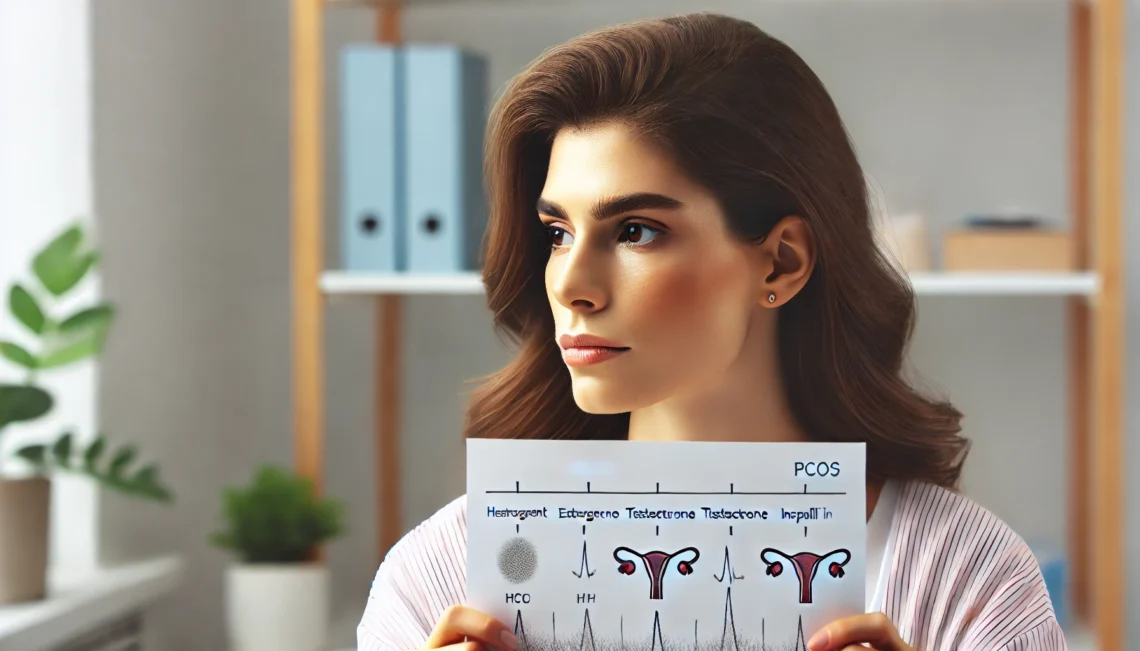Polycystic Ovary Syndrome (PCOS) is a hormonal disorder that affects various aspects of a woman’s health, including her hair. One of the most common yet frustrating symptoms of PCOS is hair loss, often referred to as androgenic alopecia. This type of hair loss is caused by hormonal imbalances unique to PCOS. In this article, we’ll explore the role of hormones in PCOS hair loss, the science behind it, and strategies to restore balance and protect your hair.
Understanding Hormonal Imbalances in PCOS
PCOS is characterized by an overproduction of androgens (male hormones like testosterone) and imbalances in other hormones such as insulin, estrogen, and progesterone. These hormonal fluctuations impact your body’s ability to maintain healthy hair.
- Androgens: High levels of androgens shrink hair follicles, leading to thinning and hair loss (PubMed Study on Androgens and Hair Loss).
- Insulin Resistance: Insulin resistance, common in PCOS, elevates androgen production, further exacerbating hair loss (Healthline’s Guide to Insulin Resistance).
- Estrogen and Progesterone: Low levels of these female hormones can disrupt the natural hair growth cycle.
Together, these imbalances create a perfect storm for hair loss.
How High Androgens Lead to Hair Loss
Androgens are male hormones that everyone produces, but women with PCOS often have higher levels than normal. These androgens contribute to hair loss through:
- Increased DHT Production: Dihydrotestosterone (DHT), a derivative of testosterone, binds to hair follicles, shrinking them over time and causing hair to thin and fall out (Mayo Clinic on PCOS Symptoms).
- Shortened Hair Growth Cycle: High androgen levels disrupt the hair growth cycle, shortening the anagen (growth) phase and prolonging the telogen (resting) phase.
- Reduced Follicle Size: Over time, hair follicles become smaller and weaker, producing thinner, shorter hairs until they stop growing altogether.
The Role of Insulin Resistance in PCOS Hair Loss
Insulin resistance is a condition where the body’s cells don’t respond effectively to insulin, leading to elevated blood sugar levels. In PCOS:
- Elevated Insulin Promotes Androgen Production: The ovaries produce more testosterone in response to high insulin levels (Healthline on Insulin Resistance).
- Triggers Inflammation: Chronic inflammation caused by insulin resistance can damage hair follicles.
- Weight Gain Compounds the Problem: Insulin resistance often leads to weight gain, which can worsen hormonal imbalances.
Managing insulin resistance is a key step in reducing PCOS hair loss.
Estrogen and Progesterone’s Role in Hair Health
Estrogen and progesterone are often called the “hair-friendly” hormones because they help:
- Prolong the Hair Growth Phase: These hormones keep hair in the anagen (growth) phase longer.
- Reduce Hair Shedding: They counterbalance the effects of androgens and support healthy hair follicles.
In PCOS, low levels of estrogen and progesterone can contribute to an imbalance that favors androgens, leading to hair loss.
Symptoms of Hormonal Hair Loss in PCOS
Understanding the signs of androgenic alopecia can help you address it early. Symptoms include:
- Thinning Hair on the Crown: The hair on the top of the head becomes noticeably thinner.
- Widening Part Line: The parting of your hair becomes more prominent over time.
- Hair Shedding: You may notice more hair fall when washing or brushing.
- Excess Hair in Other Areas: Paradoxically, women with PCOS may experience hirsutism (excess hair growth on the face, chest, or back) alongside scalp hair loss.
How to Restore Hormonal Balance and Manage Hair Loss
Managing PCOS-related hair loss involves addressing the root cause—hormonal imbalances. Here are strategies to help:
1. Improve Insulin Sensitivity
Improving insulin sensitivity can reduce androgen levels and slow hair loss. Here’s how:
- Dietary Changes: Follow a low-glycemic diet rich in whole foods like vegetables, lean proteins, and healthy fats (Mayo Clinic Guide to Low-Glycemic Diets).
- Regular Exercise: Strength training and aerobic exercises improve insulin sensitivity.
- Supplements: Consider adding Chromium or Magnesium to your routine to support blood sugar regulation (Healthline on Magnesium Benefits).
2. Medications to Regulate Hormones
Certain medications can help balance hormones and reduce androgen levels:
- Birth Control Pills: These can regulate menstrual cycles and lower androgen production.
- Spironolactone: An anti-androgen medication that blocks DHT from binding to hair follicles (Healthline on Spironolactone for PCOS).
- Metformin: Improves insulin sensitivity, indirectly reducing androgen levels.
Consult with your doctor to find the best treatment for your specific needs.
3. Support Hair Growth with Nutritional Supplements
Supplements can help strengthen hair and combat deficiencies caused by PCOS. Key nutrients include:
- Biotin: Supports hair growth and strengthens follicles.
- Zinc: Reduces inflammation and regulates oil production on the scalp (PubMed Study on Zinc and Hair Growth).
- Vitamin D: Improves hair follicle cycling and overall scalp health.
- Iron: Prevents hair loss caused by anemia.
4. Consider Topical Treatments
Topical treatments can directly address hair loss:
- Minoxidil: An FDA-approved treatment that stimulates hair growth.
- Ketoconazole Shampoos: Help reduce scalp inflammation and DHT activity (PubMed Study on Ketoconazole for Hair Loss).
- Essential Oils: Rosemary and peppermint oil have been shown to promote hair growth.
5. Reduce Stress
Chronic stress exacerbates hormonal imbalances and contributes to hair loss. Manage stress with:
- Yoga or meditation.
- Adequate sleep (7–8 hours per night).
- Mindfulness practices to reduce cortisol levels.
Preventing Further Hair Loss
In addition to balancing hormones, you can take steps to prevent further damage:
- Avoid Harsh Hair Treatments: Minimize the use of heat styling tools and chemical treatments.
- Use Gentle Hair Care Products: Opt for sulfate-free shampoos and conditioners.
- Protect Your Hair: Avoid tight hairstyles that can strain the scalp.
- Stay Hydrated: Drinking enough water supports overall hair health.




